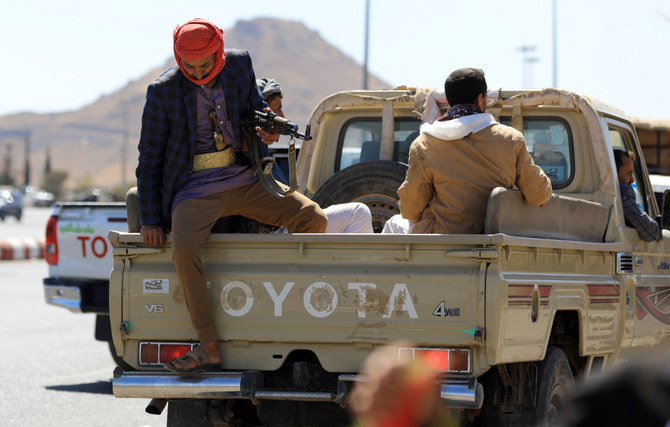AL-MUKALLA: The internationally recognized government of Yemen on Monday strongly condemned the latest Houthi missile attack on the UAE, and expressed support for the UAE’s efforts to protect its soil against the militia’s threats.
Yemen’s Foreign Ministry said that the Iran-backed Houthis had become a tool for executing foreign schemes that undermined regional security and called for an international deterrent, including classifying the movement as a terrorist organization, to force the militia to change its “aggressive” activities.
“The terrorist behavior of the Houthi militia stems from its implementation of foreign agendas that spread chaos and instability in the region, which necessitates the international community, especially the Security Council, to take a firm stance and classify the militia as a terrorist organization,” it said in a statement.
The Houthis on Monday claimed responsibility for firing the ballistic missile, which was intercepted over Abu Dhabi, and vowed to carry out more missile and drone attacks if the UAE did not leave Yemen.
The UAE, which is part of the coalition to restore legitimacy in Yemen, swiftly responded to the Houthi attack by destroying a ballistic missile launcher in Yemen’s northern province of Jouf, almost half an hour after the attack on Abu Dhabi, and launched a series of airstrikes on military sites in Houthi-occupied Sanaa.
Large explosions shook Sanaa on Monday morning after coalition warplanes struck military targets, including a maintenance base and reserve forces base, north of Sanaa.
The coalition accuses the Houthis of storing ballistic missiles and booby-trapped drones at military and civilian facilities in Sanaa, including the city’s airport.
In Yemen, military officials and experts believed that the Houthis sought to drive a wedge between key coalition members and to force the UAE to end military operations by the Giants Brigades in the central province of Marib.
“This is a clear indication that the Houthis are nervous about heavy defeats that they suffered in Shabwa and Marib, mainly after the intervention of the Giants Brigades which are primarily supported by the UAE,” Mohammed Al-Salehi, the editor of news website Marib Press, told Arab News.
The Houthis have suffered battlefield setbacks since the start of this year when the Giants Brigades launched an offensive targeting the Houthis in the provinces of Marib, Shabwa, and Al-Bayda.
Within 10 days, government troops liberated the oil-rich southern province of Shabwa and pushed deeper into Houthi-controlled territory in Marib and Al-Bayda after killing and wounding hundreds of Houthis.
The Giants Brigades are now battling the Houthis in Abedia district, south of Marib, after taking full control of neighboring Hareb district.
Yemeni officials said that the coalition’s latest redeployment of the Giants Brigades from the country’s west coast to Marib had helped troops there to reverse Houthi gains and thwart the militia’s dream of seizing control of the strategic city of Marib.
Al-Salehi said neither Saudi Arabia nor the UAE would bow to the Houthi strikes as the Yemeni rebels had become a great threat to regional and international security after possessing advanced weapons that could reach the UAE.
“The Houthis are no longer seen as merely an armed group that looted the state’s weapons in 2015. Their arsenal of weapons that can travel thousands of kilometers poses a threat to the region that requires a decisive stand.
“Keeping the Houthis with this arsenal before clipping their wings and defeating them militarily would make Yemen an epicenter of terrorism and exporting unrest to the region and neighboring countries.”

